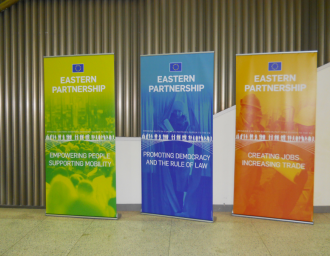Challenging future for Georgia and Moldova after the Vilnius Summit

Ukraine’s decision to delay signing the EU Association Agreement at the EaP Summit created logical doubts about Georgia’s and Moldova’s future integration processes, writes Alexander Chanadiri.
The fear that the EU-Ukraine deal tensions might damage the successfully canonized “well-doing” of EaP partner states raised a number of questions at the Summit. One might ask whether there is a guarantee for avoiding similar problems in 2015. Will Russia try to increase its pressure over other EaP countries and suspend their integration processes? Can the EU back Georgia and Moldova in case if Moscow tries to influence them? It’s hard to predict and answer these questions, especially the last one; however, politicians tried to voiced major messages that might be heard and analysed in Moscow and Kiev.
According to Herman Van Rompuy, President of the European Council, the Eastern Partnership project is not about a zero-sum game, and the agreements on association and free trade should benefit Russia as well. “If neighbourhood economies perform well, better it is for Russia. That’s the strength of the EU – if it goes well with one country, all are benefiting from it. This is an essence for trade and trade relations as well”, said the President. He also mentioned that the actions taken by Russia are incompatible with how international relations should work on the modern European continent. Russia remains a strong strategic partner of the EU and the EaP issues will be discussed on the EU-Russia joint Summit in the end of January.
As for Jose Manuel Barroso, President of the European Commission, any possible private agreement between Russia and Ukraine regarding the suspension of integration processes of the later is strongly unacceptable. “We have initialled an Associated Agreement with a sovereign country – Ukraine and we don’t need a trilateral agreement on trade. We didn’t invite third parties when we initiated such agreements with Canada or S. Korea to for finalization of the deals. The times of limited sovereignties are over in Europe!”
Lithuania’s President Dalia Grybauskaite criticized Ukrainian leaders and blamed them in using an issue of so called “pressure” as a tool for stopping the integration processes within the EU. “External pressure cannot be used as an excuse for the decisions of the sovereign countries”, she added.
On the other hand, Georgian leader Giorgi Margvelashvili observes Moscow’s behaviour very carefully. According to him, Georgian ruling elite is trying to deliver messages to the world that prosperous Georgia will be beneficial for all its neighbours. Similarly to Rompuy, Margvelashvili expressed hopes that a zero-sum game will be gradually replaced by the win-win approach to the EaP. He mentioned that Georgia has a clearly determined advantageous country-wide national interest that goes through Europe. “We have a national consensus in the country over the Europeannes of Georgia and its people. Also, we are pretty successful in showing to Russia that Georgia is not an enemy and a stable Georgia is a benefit for Russia’s neighbourhood. Hopefully we start discussing problematic issues rationally, rather than emotionally.”
Thus, historic steps have been taken in advancing cooperation within the EU’s Eastern neighbourhood – Association Agreements are initialled with both Georgia and Moldova. World is expecting a new round of political and economic disputes among world powers. Euphoria of the Summit is settling down and soon first prompt political predictions of the future developments will be possible to draw. The Ukrainian issue should give descent food for thought to the EU officials and serve as a lesson for conducting more carefully strategy towards its devoted partners in order to avoid total failure in the Neighbourhood Policy.
Originally published at Eastbook.eu
Alexander Chanadiri, Eastbook.eu
-
03.01
-
07.10
-
22.09
-
17.08
-
12.08
-
30.09








































